#chuza
Explore tagged Tumblr posts
Text

"Call me Principal~"
Neji cosplaying Chuza lmao this is a gift for the friend who got me into JJ c: you have her to thank for the existence of this XD
#jack jeanne#neji kokuto#chuza shuri#fanart#jackjeanne#my art#digital art#artists on tumblr#otome#otome game
18 notes
·
View notes
Text
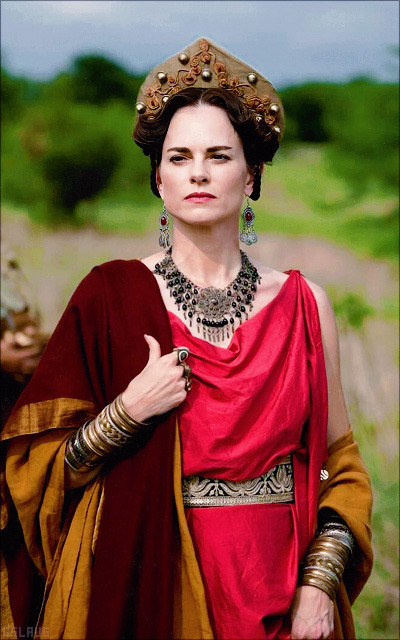
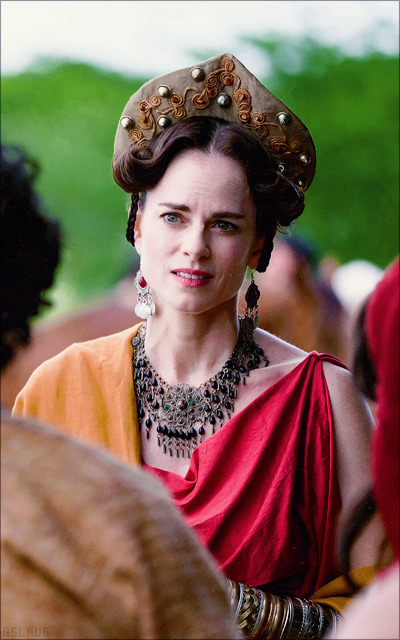
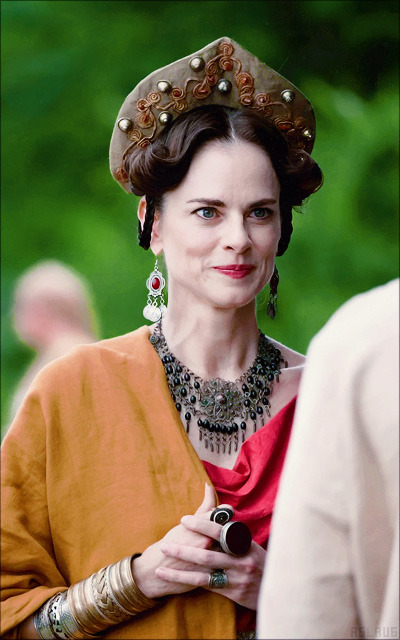
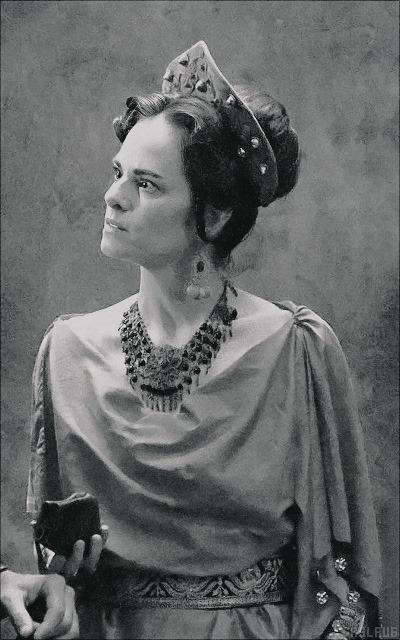
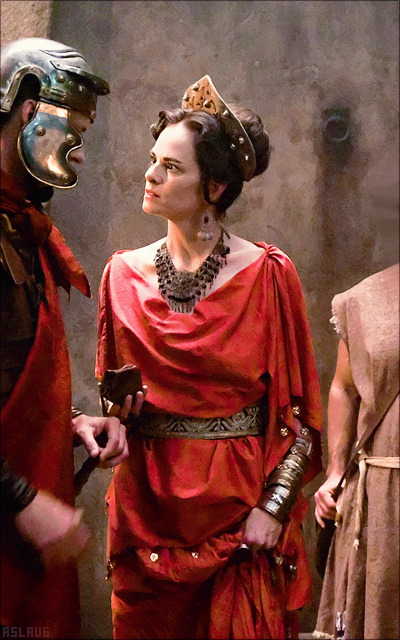
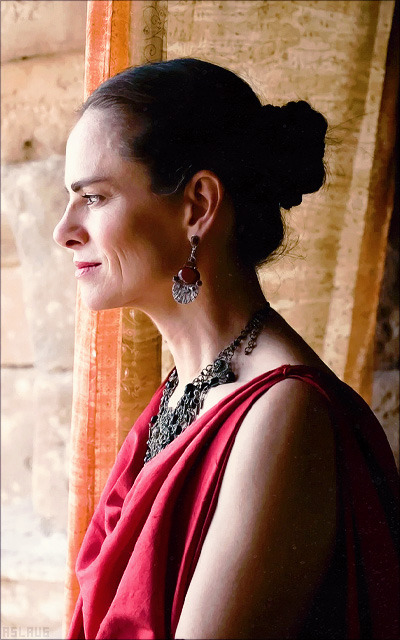
Amy Bailey in The Chosen (s3) as Joanna
#amy bailey avatars#thechosenedit#amybaileyedit#period fc#the chosen#joanna#amy bailey#joanna wife of chuza#rpg resource#rp avatars#avatars 400*640#*avatars#*mine#didn't watch the show#just saw the stills of Amy#here for her inner Kwenthrith#bye
24 notes
·
View notes
Text

Shuri Chuza - Visual Novel: Jack Jeanne
#Shuri Chuza#Jack Jeanne#anime character#anime aesthetic#oc aesthetic#video game character#visual novel
1 note
·
View note
Text

THE DESCRIPTION OF SAINT JOANNA The Wife of Chuza and the Holy Benefactor of Jesus Christ Feast Day: May 24
Joanna was one of several women in the Bible healed of 'evil spirits and diseases' by Jesus Christ. After being healed, Joanna accompanied Jesus and the twelve disciples on their travels from town to town and helped support the Lord's ministry.
As the wife of Chuza, the manager of Herod Antipas' household estate, Joanna was a woman of means and influence. Along with Mary Magdalene, Susanna, and others, Joanna helped provide food and supplies for the missionary troupe from her own wealth.
Whether Joanna had been set free from a demon or healed of some mental or physical disability, we are not told. But we do know that Joanna remained wholly devoted to Jesus until the end. She traveled with Him on His final journey from Galilee to Jerusalem. She was present at Jesus' crucifixion and burial.
Later, Joanna returned with other women who had prepared spices and burial ointments to anoint Jesus' body. Upon discovering the empty tomb, Joanna and the others ran to report the news to the apostles.
Joanna is mentioned in the Bible only in the Gospel of Luke. The Herod that Joanna's husband was steward for was the tetrarch of Galilee, so Joanna herself must have lived in Tiberias, the capital of Galilee. Scholars believe Joanna may have been a key source of much of the detailed information Luke included in his writings about the life of Jesus. Tradition holds that when John the Baptist was killed during Herod's birthday, she obtained his head and buried it honorably in an earthen vessel on the Mount of Olives, where Herod had a parcel of land.
By welcoming women like Joanna into His inner circle, Jesus broke with Jewish tradition and the strict social divisions of His day. And Joanna, no doubt, stepped down from her aristocratic social position when she chose to follow Jesus and associate with His disciples.
After her conversion, Joanna traveled with Jesus, served Him, learned from Him, and financially supported His ministry. In first-century Judaism, such conduct was considered scandalous for women, and especially a married woman. Joanna's life is an example of how the gospel demolishes class barriers and social prejudices. The fact that she was the wife of a man in Herod's employ is ironic, given the general Herodian hatred for Jesus.
Although little is written about Joanna in the Bible, we can glean from just a few lines that the Lord was precious to her. She had the privilege of being one of the first people to share the good news of Christ's resurrection.
Joanna was a loyal and generous follower of Christ. She proves that the kingdom of heaven is accessible to all who are willing to give their lives in humble service to Jesus and others.
#random stuff#catholic#catholic saints#saint joanna#joanna wife of chuza#sta. juana#juana de cusa#myrrhbearer
0 notes
Text

Yellow Banded Awl (Hasora schoenherr chuza), family Hesperiidae, Singapore
photograph by Koh Cher Hern
674 notes
·
View notes
Text
Jack Jeanne Special Gold Saves

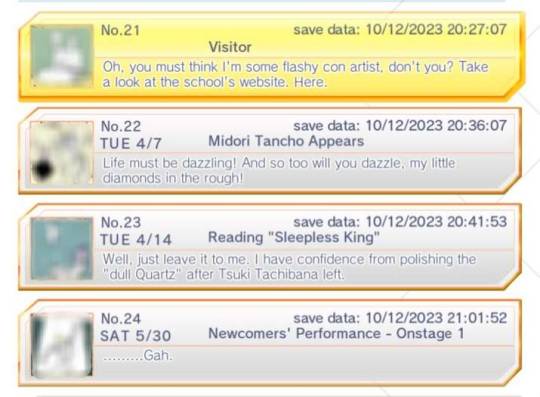
Japanese credit and English translation credit
WARNING: Potential Route Spoilers can be found below, continue reading at your own risk.
COMMON ROUTE
In the scene at the shrine, when Chuza says, "Oh, you must think I'm some flashy con artist, don't you? Take a look at the school's website. Here."
In the scenario that occurs during the first singing lesson, when Tancho's line, "Life must be dazzling! And so too will you dazzle, my little diamonds in the rough!"
Tues April 14th - In the conversation scene after rehearsal, when Neji says, "Well, just leave it to me. I have confidence from polishing the 'dull Quartz' after Tsuki Tachibana left."
Sat May 30th - During the "Newcomer Performance", when Otori's line "…………………… Gah." (Scene where Otori's event illustration is displayed)
During the preparation period for the summer performance, during the 5th Weekend with Ion'', the line "I mean, I'm now a match for Kiito with his incredible physique." (before starting song practice)
In the additional scenario that occurs when you visit Mona Star School 10 times during the preparation period for the summer performance , when Mona 's line “Oh, yes! I was known as Univeil's Brown Rose, you know?''
Sat July 25th - During the "Summer Performance", when Kai's line "Don't play dumb. It's as if… " (Scene where Mutsumi's event illustration is displayed)
During summer break when selecting "Go Out" with Kasai at Onyx Dorms (playing soccer/football) - Kasai says, "Or so you think…!"
Mon Oct 12th - In the scene during rehearsal, when Orimaki 's line "Gotcha! Hup. Hahaha."
Sat Oct 24th - During the “Autumn Performance,'' right after choosing to speak to Fumi from the wings of the stage, his line “Wow, that really ticks me off!!!"
Sat Oct 24th - During the “Autumn Performance'', after choosing the option to speak to Suo, his line "I'll kill you… I'll kill you, I'll kill you, I'll kill you, I'll kill you!!" (Scene where Sou's event illustration is displayed)
Tues Dec 22nd - After rehearsal at the theater (at night), in the conversation scene with Mitsuki, his line “No matter who you are, I accept you."
Thurs Dec 24th - During the "Winter Performance", when Kisa's line "Aaaaahh… agh…!" ( Scene where event illustration with Mitsuki is displayed)
KISA ROUTE
Sat Jan 16th - when Ao says, "I'll be rooting for you. If times get tough, just remember Ao is here. I'll always be with you."
Wed Jan 27th - when Kisa 's line "The central nation of Kielce is my entire life" (Scene where Kisa's event illustration is displayed)
Sun Jan 31st - In Kisa's route , when Chui’s line "Come with me. I’ll take you as far as you want to go" appears. This is a scene after going out.
Sat Feb 27th - Before the play begins, in the scene in the theater/corridor, Kisa says, "So watch me, okay?"
SUZU ROUTE
In Suzu's intimacy scenario 3, when Suzu's line " ... " appears. (Scene where event illustration is displayed)
Mon Jan 4th - In the scene in the Rhodonite practice hall, when Mare's line "Whaaaaaaaa?!” (the second time)
Sat Feb 27th - After the Final Performance on Suzu’s route, when Kamiya 's line “I'm sorry, I'm sorry, I’m sorry, I’m sorry, I’m sorry'' appears. (Scene inside the Universal Theater)
MITSUKI ROUTE
In Mitsuki’s Intimacy Scenario 2, when Mitsuki says, " Do you guys mind…?" (Scene in the rehearsal hall at the beginning of the scenario)
Fri Feb 12th - In Mitsuki’s route, when Kaido says , "I was waiting for you to say that! Sugachi, I want you to be Onyx’s victorious dancing princess!"
SOU ROUTE
Mon Feb 1st - In Sou’s route, when Momonashi says, “I want to consume Chui Tanakamigi. I want to take him, swallow him, and turn him into myself.” (Scene at Mt. Odate)
Wed Feb 24th - In Sou’s route, when Sou says, “Your ability to think about yourself gets warped and you can’t see the world for what it is.” (Scene where event illustration is displayed)
KAI ROUTE
Fri Jan 29th - In Kai’s route, when Kai says, “What is it?” while talking to Mitsuki as he’s looking for Kisa.
FUMI ROUTE
Fri Feb 19th - In Fumi’s route, when Fumi says, “Sorry… I wasn’t careful and I got sick.” when visiting Fumi in his room.
NEJI ROUTE
Wed Feb 24th - In Neji’s route, when Neji says, “I was excited to see how far he’ll go. Which is why I wrote scripts for him and even played his AI Jeanne.” when speaking in the Quartz Training Room.
169 notes
·
View notes
Text

Saint Joanna wife of Chuza
1st Century
Feast Day: May 24
Saint Joanna the Myrrh-bearer was the wife of Chuza, the steward of King Herod Antipas. She was cured of evil maladies by Jesus, then followed and provided for Him and His apostles. (Luke 8:1-3) She was one of the women who discovered the empty tomb on Easter morning. (Luke 24:10) Saint Joanna is known to have carried the myrrh that was to prepare Jesus at His death.
Prints, plaques & holy cards available for purchase here: (website)
50 notes
·
View notes
Text
𝐒𝐞𝐩𝐭𝐞𝐦𝐛𝐞𝐫 𝟐𝟎, 𝟐𝟎𝟐𝟒 𝐆𝐨𝐬𝐩𝐞𝐥
Memorial of Saints Andrew Kim Tae-gŏn, Priest, and Paul Chŏng Ha-sang, and Companions, Martyrs
Lk 8:1-3
Jesus journeyed from one town and village to another,
preaching and proclaiming the good news of the Kingdom of God.
Accompanying him were the Twelve
and some women who had been cured of evil spirits and infirmities,
Mary, called Magdalene, from whom seven demons had gone out,
Joanna, the wife of Herod’s steward Chuza,
Susanna, and many others
who provided for them out of their resources.

#jesus#catholic#my remnant army#jesus christ#virgin mary#faithoverfear#saints#jesusisgod#endtimes#artwork#Jesus is coming#come holy spirit#Gospel#word of God#Bible#bible visuals#bible verse of the day#bible verse
17 notes
·
View notes
Text
This post will also have spoilers for all the things. Oops should I have been warning about that.... I tried to @ you in a post i made on like 2 hours of sleep about the Seagull because you got me thinking about it again, but I haven't been on tumblr in years so I don't know how to make it work right, so I'll just do it here! (Here) People say that Chekov wrote himself into many of the characters in the Seagull, not just Trigorin, but not NOT Trigorin. Both Treplev and Trigorin are Chekov and both of them are Neji. Even more so on his route.
I have so many thoughts on why Neji left Amber, and I imagine he has even more, and none of them alone are the full picture. But reading it through that specific line in the Seagull -- I wonder if Neji was headed even more down that route, and would have if he'd stayed. Chui will literally just walk away from a performance everyone has been destroying themselves to perfect the day before because he sees no value in it. Neji, even a year and a half in Quartz, is still saying rather mean things without explaining himself.
(Bless Kai and Fumi at the end of Neji's route who are just trying to explain to Kisa that Neji is kind of a disaster actually, when it comes to communicating and being a person in general. He's been running from being a person for so long, maybe it worked, just not in the ways he meant. Kai saying something like "He's actually terrible at knowing what he needs to actually say out loud and what he absolutely should not say out loud, but if I told him that he'd just go 'if it's you saying it its really all over' or something")
Neji when he's being mean is my favorite, I love it when he's mean but -- he's for sure got a bit of a mean streak -- (that foiling web of Neji and Fumi and Chui -- genius and art and wings and expectations and family history in performance and --)
I wonder if Neji in Winter Arc is in fact a toned down, more connected, more -- as the game uses -- grounded version of where he was and where he would have been had he stayed in Amber. Quartz is about connection -- it's about how actually its better if people from different places support each other and each bring their own strength and point of view together -- as messy and dramatic as it may be -- as many clashes and upheavals as it may cause.
Like I'm a big time Chuza hater for plenty of reasons, but the fact that he's got this secret little plan that makes no sense to save a class whose merits he can't even articulate just. Ew. There is power in Quartz but its not one Chuza seems to even understand or care about. Or really even believe in. But that's a post for another time and this reblog chain has gotten so long. Ahaha... If you want me to talk more about anything, please drop an ask I'm happy to riff -- But yes!! I'm so glad you also see it as Kisa basically showing him things he's been otherwise looking away from but that he knows -- Kisa's unique skill -- the game tells us -- is that she can reflect the true form of someone back at them. It's actually extremely similar to Chui's unique ability. The game doesn't say specifically that anything supernatural is involved in either of these per se, even if Chui speaks as if he's talking more about magic ritual than theater (though all theater is born from ritual, if you go back far enough) -- but regardless of how you read it. Both Chui and Kisa seem able to do something similar. Neji does it too, actually, but in a different form. He pulls things into his scripts, consciously and unconsciously.
Mitsuki has him nailed down EXACTLY at the end of Neji's first Affection Event. People get ~vibes~ off Chui and Momonashi and actually Kisa quite a bit, but Mitsuki gets them (correctly) off Neji and his little dragon's den of an office. I love Mitsuki for that.
Mitsuki also says outright what it is Neji is chasing. Someone who can sate him. Someone who can keep up (someone who puts up with honestly far more than she should, Kisa, not everything Neji does is reasonable you should just say no sometimes, baby. I bet Chui would just wander off mid conversation when Neji got too far into the antics.)
There's no set route order, but you absolutely need to play Neji's first Affection event in full again if not for the first time AFTER the ending of Soshiro's route so you get the comparison on which vibes it is that Mitsuki is picking up. That Amber Class, man... Something about that Amber Class and Vibes. It is not by accident there is shared metaphor being used there, I imagine.
It's very important to me that Neji gets what he gets from a line HE wrote into his little one man show. Kisa is literally saying his own words back at him. He's already written the truth -- if Kisa's mirroring is in her acting, and Chui does it via dance and performance, Neji's is in his writing. Like you said, Neji is working through STUFF in Oh Rama Havenna - It's the first time the game pins him down on that and it's the biggest "Neji declared winter a poorly run group therapy session with no-ones permission because he's a menace, but at least he doesn't spare himself either" - but as Sou points out. The water motif is in a lot more than one play. He's writing himself into everything. Like Chekov and the Seagull, if you believe those bits of literary analysis.
He wrote it down, but he won't LOOK at it, not really, until Mitsuki yells at him for it. His line about not playing his female characters with interiority is another obvious lie -- Neji's most famous role, and the last actual complex role he'd played before Domina is Takihime. No one, not even Chui when he's explaining that Neji couldn't complete the role, says Takihime was lacking interiority. Like sure, Employee A doesn't seem to have much interior life, but neither does the fortune teller or Ushinoko (though, speaking of themes Neji writes into his own characters, Mr. "I'm always planning the next play even when I'm working on this one"....). I'm just glad the game didn't try to say he can't WRITE the interiority, which was a spoiler I read and I was gonna scream. Because most of his most compelling, complex, deep characters are women. If the game had tried to pull that after Chichi and Rukiora.... Well maybe it would have called attention to the lie more, and that would have been nice in its own way. Ugh I could rant forever about every part of this...
Chui and Kisa together is a terrible combination for both of them -- Neji knows this, and eventually, on his route, even puts it into normal person language instead of making 20 jokes per minute about telling Kisa to get good at running or telling Chui he's not sharing. (The two of them I swear). Both Chui and Neji are chasing a reflection of themselves, and its something they had in each other.
Maybe one day I'll finish this fic but its a line Neji DOESN'T read right after the one he asks Kisa to read. "Maybe she'll be able to understand me." Like. Sir, the mirror you are chasing? It's in your hand. You wrote it. Look. Look with your eyes.
Chui outright says that Kisa will be able to reflect his talent and pull him even higher -- as I said, Kisa and Chui's abilities are similar. If they're fixed on one another, maybe they really could reach escape velocity together. They'd never look at anything else, though, and they'd end up somewhere so far from everything else, it'd basically destroy them. Not to mention what it'd do to the actual art -- something that Neji is trying to get Chui to understand -- Chui can bring to life anything that Neji can imagine, and Neji can imagine things that work perfectly to bring out Chui's abilities, but-- Like I said in the post I linked -- that experimental script at the start of The Seagull? That feels exactly like the sort of thing Neji would write and Chui would pull off spectacularly, actually (and now I really wanna see it ngl). In Puppet, he takes the accusation of "too experimental" as a high compliment. But when he comes to Quartz, he's as much grounding himself as he asks Fumi to do to make things work. That line about "it must have felt like ripping his wings off" which Chui literally echoes when talking about Neji in his route..... that.... foiling...... ugh. This is so long again oops. Like I said, feel free to drop an ask on anything specific if you want me to rant even more. I didn't even get to religion. Ririya and I actually went back and forth on specifically what Towada might be getting at -- I really should try to make that into a post one of these days. Because in terms of Neji writing himself into things, in terms of that imagine with wings -- Ishida dropped Towada's comment "like a kid in the cabbage patch" and then Towada is like "I'll clarify" and I was like that... that is not a very clear clarification...
Mary Jane and Frankenstein
In honor of Spooky Month and the imminent arrival of Mary Jane Day, I have done the scariest thing imaginable, returned to tumblr dot com to write a meta/analysis post.
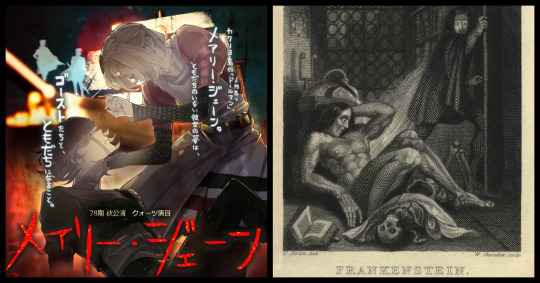
[image description: images side by side of the top of the Mary Jane poster, showing Mary looking down sewing Jacob, next to the 1831 edition front panel illustration of Frankenstein, showing Victor looking down on his creature in horror]
This is a mostly informal attempt to collect my thoughts on the fact that Neji’s little spooktacular, in addition to being a very pointed exploration, as all of his plays are, of art and theater, the school, himself and his classmates (without their permission, the menace) and just, a lot of fun, is perhaps one of the best piece of Frankenstein related media I have EVER seen in relation to the original novel.
This is pulling a lot of things from the Stage Script rather than the in game version, which summarizes a lot of the things I'm mentioning specifically. You can find the full Stage Script in the game menu, or
[ here ]
because I love this play so much that I needed a searchable version.
Caveat Emptor here is that it’s been a long time since I’ve read the novel in its entirety. If this game gets me to read it again, I may have to revamp things. But again, largely informal. But very long, somehow.
Oooops.
If you're curious about anything in here and want to expand on it more, or hear my thoughts on it, please feel free to reblog, send an ask, or message. Or ask me elsewhere if we're already connected there. There's a lot I glossed over, especially at the end of this. I have a lot to say, and if we're back to writing metas on tumblr dot com the chances of stopping at one are slim.
Mary as Frankenstein, Mary as Mother
Mary’s name is acting as several allusions at once. I mean, there are at least 3 Mary’s in the bible one could point to - Mary, Mother of Jesus is absolutely at play. But Lazarus’s sister is also a Mary. And while technically Mary Magdalene is often misrepresented and amalgamated with other characters in retellings, the idea of “purifying” her has canon precedent - having had seven demons driven out of her.
Of course, Neji’s twisting all of it, in his Neji way.
(Interestingly enough, these are the Three Marys of the Quem Quaeritis - widely considered a point of "rebirth" of theatre in Europe during the middle ages.)
But Mary is also the name of Mary Wollstonecraft Shelley, author of Frankenstein. And this, this is a Frankenstein story. It is, in fact, a beautiful inversion of so much about the book that gets left out in most far more serious attempts at a Frankenstein story.
The original book is about motherhood and its inversion. Much could be said about when during her life she wrote it, or her own mother’s death shortly after she was born, or any number of things that have been hashed and rehashed a thousand times from AP English to the ivoriest of towers. But, fan of Death of the Author that I am, I posit you don’t need any of that to see in the text.
Victor creates a person with science, rather than by ‘nature’. It is an unnatural birth. And Victor is just about the shittiest possible parent. The Creature spends a good deal of time explaining to him, when they meet up again, that Victor is his father, and that he was literally abandoned as a newborn, and maybe that was kind of the worst possible thing he could have done. It’s not a mantle Victor has any desire to take up, the role of a parent. He wanted to create life, but he didn’t want to be a parent. But that’s what it means to create life.
By gender swapping the role, you’re already inverting the inversion - but Mary’s creation is no more “natural” than Victors. But it is different. Neji, ever witch-coded himself, has Mary put one of her own hairs into every doll. It’s returning the shared body to the act of bringing these creations into being.
But even without that. Mary considers herself a mother. She considers herself a mother despite having no memory of one herself - Mary knows lots of things she shouldn’t, and doesn’t know many things she should. But she calls herself a mother. Even before any of the dolls move, she is their mother. A motherhood she wants to desperately share with others. She considers the act of selling a doll a kind of ‘adoption’. These are her children. And they know it. It’s stitched into every stitch in their doll bodies. They know Mary is their mother. And they know she loves them.
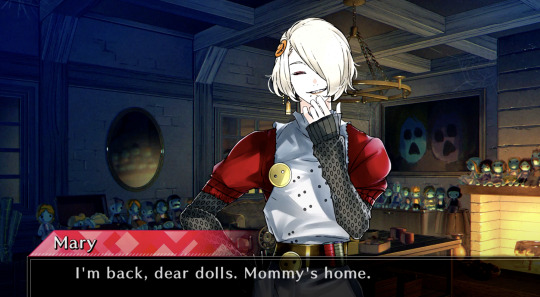
[image description: screenshot of Mary in her workshop. The text shows Mary's line saying "I'm back, dear dolls. Mommy's home."]
The Creature comes to think of Victor as a father - an absentee one at that, and craves that love, a love he is never shown. Mary averts this spectacularly. She creates out of love.
Names
Mary takes great care in naming Jacob, and ends up doing so, though she doesn’t say it, after a biblical pun (Jacob, in the bible, is explicitly named such as a pun on the word “Heel”). But names are important to Mary, and she is sure to give one to Jacob as soon as he’s fully formed, even before she sees him wake up. Victor very particularly does not name his creature. Instead, he tends to throw around insults, many of which are demonic or satanic. When they finally meet again, the Creature says to him “I should have been thy Adam.” Mary averts this mistake, among so many others, spectacularly. Being called by her name is important to her, and she extends that offer to Jacob even before he’s fully “born.” Like a good mother.
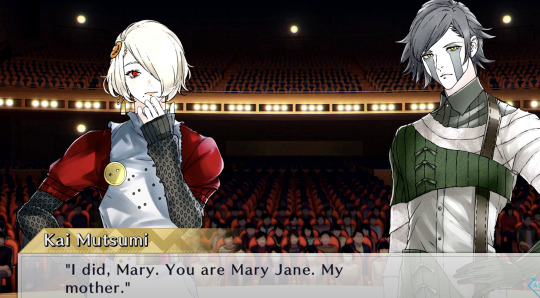
[image description: a screenshot showing Fumi and Kai dressed as Mary and Jacob, as seen from the stage with the audience in the background. Kai is saying Jacob's line "I did, Mary. You are Mary Jane. My mother."]
Not only does she give him a nice biblical pun of a first name, she shares her last name with him, again before he’s even more than a doll. That’s her boy, that’s her best friend. That’s her family.
The song here, which is only sung and dance AFTER Mary has given him a name is called "A Friend Without A Name" Almost as if specifically calling attention to this fact. Mary is as much the friend without a name as Jacob, if not more. She is the one that has never heard another voice say her name, where as Jacob is called his before he's even awakened by the Island's magic and Mary's love.
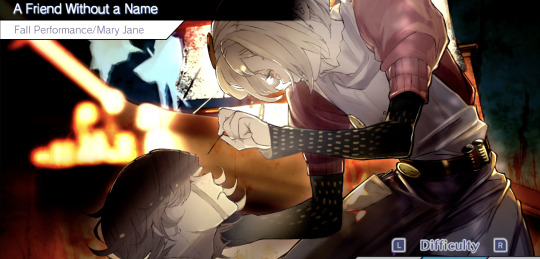
[image description: the screen from just before A Friend Without A Name showing Mary and Jacob's CG of Mary Stitching Jacob.]
Mary as a Good Mother
Some of the weirder moments in the play actually make a lot more sense when you look at them through this light. Jacob randomly saying he hates Mary in a fit of jealousy? It’s because he’s a child. He’s a baby. That’s a baby boy. Mary, herself quite childish, forgetting so much of what’s important, as the Island is known for, reacts incorrectly, but understandably. This is her first friend - and far more of one than the others she thinks she’s made, in terms of mutual respect, compassion, and small acts of kindness. But this level of connection and emotional reciprocation is still new to her. She’s hurt. She runs.
And The Order of Shadow’s duo is quick to tell her that that’s just the nature of ghosts, telling themselves a little joke about how they have been lying to her from the start, and fully intend to stab her in the back, far more than any ghost. Victor’s instinct is to consider his creature a monster, a fiend, a demon. Mary is told by characters positioned as far more knowledgeable about the world than her that he must be exactly that.
And how does Mary react? She refuses to believe it. Even hurt as she was, even with someone who just said this is their entire expertise telling her it’s in his nature to be cruel, Mary refuses to accept it. She still loves him. She makes the right choice. That’s her best friend. That’s her family. That’s a (un)life she brought into this world, and she stands by him. No matter what. She would risk her life to rescue him. She will fight for him.
This is why that scene has to be there. Because she has to be given that temptation, that trial. And she passes spectacularly in a way Victor will not, to the end.
It’s also a thematic explanation for the garbage scene, which is probably there as much to be silly as anything. I mean, it’s also there to show many other things — Mary’s eccentricity is ingenious in its own quirky way — the islanders who hated her, who she didn’t understand, give her the tools to save Jacob and the others — Mary not even considering the same level of violence — it being a moment of empathy between Mary and the islanders who never showed her even a shred of it back — she understands that they couldn’t tell which food was rotten. She sees things from their point of view. And many more besides.
But, from the point of view of Mary as a Mother, Mary succeeding brilliantly where Victor failed… Mary is literally willing to coat herself in filth to rescue Jacob. Parenthood is messy. It involves a lot of gross things. Even Victor's, sanitized of the normal processes and cloaked in science, was made of corpse parts. But the play actually brings back a part of parenthood that Mary had been able to avoid thus far - the mess. Mary, once again, doesn’t hesitate. For Jacob? She’ll do anything.
Jacob is shown love and kindness, and he responds with the same. He has the same unnatural strength as Victor’s creature, but he’s only ever shown using it to rescue himself and others. When Mary asks for a handshake, he replies that he can’t, because such would be an invitation for a duel. And that they should hug, instead. Mary didn’t even know what that was. Far from disgusted by the lack of warmth she feels from his skin, she looks beyond that, to the emotional warmth and connection.
Frankenstein’s creature, famously, lashes out in violence. While Victor views this as his responsibility only in so far as he brought a demon into the world, he doesn’t understand, even when the Creature eloquently explains it, that the Creature was a being who had only known cruelty.
Jacob knows love. He knows kindness. He knows sadness and loneliness and pain. And refuses to engage in any form of touch that could even be considered violence. They hug.
Which is not to say Mary’s creatures can’t kill. But they do only to protect their mother, and only after Mary has risked everything to protect Jacob. They are Mary’s children, not Victor’s. Even their violence is an act of love. And in another inversion - they are the ones telling Mary to run. Something she does not want to do. She doesn't want to leave them behind. After all, they are her children. She departs from them only at Jacob's literal tug away, and with an apology and a thanks.
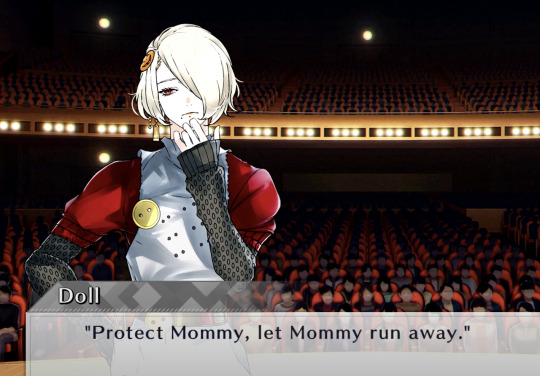
[Image description: screenshot of Fumi, dressed as Mary Jane, shown from stage view, with the audience behind, while a Doll's lines "Protect Mommy, let mommy run away." are shown below.]
Boats and Framing
But the parallels are not only in the most famous part of the novel - consider this - Frankenstein, the novel, is written as a series of nesting framing narratives. The bookend narrative, the one we open and close on, is a boat. Most Frankenstein adaptations cut the boat trip frame, but Mary Jane very specifically opens and closes on a boat at sea, and its ending is EXACTLY the reverse of Frankenstein’s. If for some reason you’re this far in and don’t want more spoilers for a 200 year old book, now’s the time to click away, I guess.
The boat is on a course to the Arctic. Victor is on board, telling his story, because his creature has fled there, away from humanity. Victor intends to pursue him endlessly, to kill him, fully aware that he is almost certainly going to die, frozen and alone, in the process. We don’t get to see this happen - the story ends merely with the certainty that this is what is coming. Victor, on a boat, intending to go to the ends of the earth alone to kill the Creature he brought into the world, treating it like some burden and punishment.

[image description: a screenshot from Mary Jane, with the CG of Mary and the Ghosts on the ship, with the summary text overlayed on it reading "Friends together, fun forever."]
How does Mary Jane end? With Mary, and Jacob, and a cast of playful characters — her friends — sailing off for the ends of the world, together, in pursuit of life and happiness - even in death.
Ghost Party ends the play because its a triumph. Neji throwing out Horace’s Ode to Cleopatra in there because he can’t not do silly things like that — but Frankenstein famously contains many references to classics — many made by the Creature himself, who was forced to educate himself via books, lacking a parent to help him.
Mary Jane takes a section of sheer joy out of a poem of complex mixed emotions, and says them repeatedly. This is a party. This is a triumph. Mary leaves on a boat for the ends of the world a success, a good mother, a friend. And a human.
Humanity, Connection, Isolation
The play deconstructs so wonderfully this question of humanity. Mary doesn’t find any joy in it, despite barely understanding it herself - until she is able to use it to help others. The first time in her life she’s been glad to be human - something she only really understands as “needing to eat food” - is when it gives her the ability to save her ghost friends. If that’s what humanity is, the ability to care for others, the ghosts of the chapel, the play is telling us, are far more human.
One of my favorite exchanges in the play is after Charles and Figaro explain to Mary that the corpse parts used to make Jacob were their friends. Mary is not malicious in the least. She has no concept of this act as sacrilege or desecration. She is genuinely childishly innocent in most of what she does. And she can’t understand it.
Mary says “If you can love unmoving corpses so much… How can you not feel for living ghosts...?"
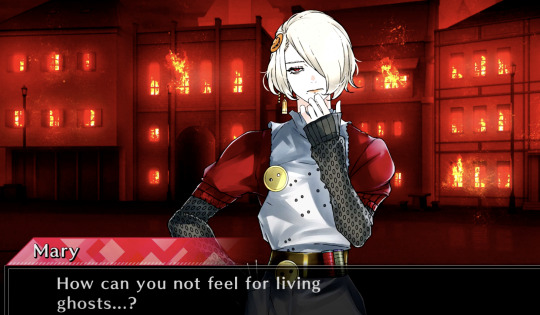
[image description: Mary in front of the burning town. She's saying "How can you not feel for living ghosts...?"]
Charles responds that she must be completely off her rocker. But she’s correct. Mary sees life in front of her, even undead life, and wants to protect it. Even the Islanders, who only ever treated her with distain, who only ever made her miserable — she doesn’t want them to die, even knowing they are already dead.
Outside of Mary, her oddball eccentric self, in this play, the more human someone is, the crueler they are. Figaro and Charles are only ever here to mess with her before dragging her off to be killed. They have no willingness to even try to understand anything outside their world view. The Islanders, who think themselves human, revile Mary, and make up terrible rumors about her.
Both of these groups do so, in part, for similar reasons. Because to have empathy would force a realization on them they cannot bear. The last thing Figaro realizes, before he’s dragged into the most poetic of justices, is that the dolls have SOULS. They are ALIVE. It’s a moment of anger and madness, but it’s a last minute realization that he’s been wrong now that it’s too late. Of course it’s not a revelation he’ll remember. You tend to forget what’s important on Kakuriyo Island.
If Mary averts all of Victor’s mistakes, Charles and Figaro make many of them. Seeing the Creature as a collection of corpses, as demonic, as an abomination against God. Reacting only in anger, in cruelty, in violence. Chasing something they view, wrongly, as an abomination to the ends of the earth, until it kills them. Mary has Victor’s role, but Victor’s actions and outlook are given to the antagonists.
It’s fascinating to me, then, that there are two of them. In the version of the play that gets performed, they’re twins - doubles. Two halves of one whole, who egg each other along in their cruelty. But they also exist to show that even these two are capable of empathy and connection. They do in fact understand the thing they tease Mary with. They have the ability and understanding to extend that to Ghosts, or to Mary. They simply refuse to. Figaro really does love his brother - his grief at his death is genuine. It’s a clever way to show that.
In the book, Victor is extremely isolated, by his own choice. He withdraws from everyone in order to work on his creature, and after he runs from it, he keeps to himself just as much, now blaming the idea that he can tell no one what he’s done. Even when he’s surrounded by family, he is utterly alone. By choice. The Creature eventually lashes out and kills the woman Victor intended to marry. In Victor’s mind, he cares about this girl, but it is not in his actions. Like much else, she exists more as a creation of Victors mind than something in the world for him to interact with and care about. Until she dies. Then he’s furious. And decides to spend the rest of his life chasing down the Creature to kill him for it.
This contradiction in Victor has always read as intentional to me. The book is calling out his hypocrisy here. He doesn’t actually desire connection - the connection his Creature eloquently explains his longing for. But if it is denied him, he acts like he’s been affronted, painted with a shallow layer of sanctimoniousness or justice. Murder is bad, of course, and the Creature shouldn’t have killed an innocent young woman to get at Victor, of course. But the discrepancy between the way Victor reacts to her in death and the way he does when she’s alive is intentional.
Victor has every chance for human connection. Time and time and time again he’s given that chance and refuses it. Even to the very end, on that boat. He could stay with the crew. Sail back home. Let it go. The Creature has run away from humanity which it has come to despise as much as its absentee father disdained it. There is no need to keep chasing. But Victor cannot let it go.
The Creature longs for connection and is denied it. Victor disdains and refuses it, even when it’s available to him.
Mary as The Creature
Contrast this with Mary — It is Mary, rather than Jacob, that is in the Creature’s situation here. Mary is constantly chasing connection. Constantly trying to find something to reflect humanity (compassion, life, emotions — rather than the matter of blood and flesh that Figaro and Charles always talk about it as) back at her. And she can’t get it. She, like the Creature, hides in the bushes and watches it from afar. She, like the Creature, chases after it only for people to run away, to treat her with cruelty. Mary is Frankenstein, but she is also a reflection of the Creature. She is both in one, in this sense.
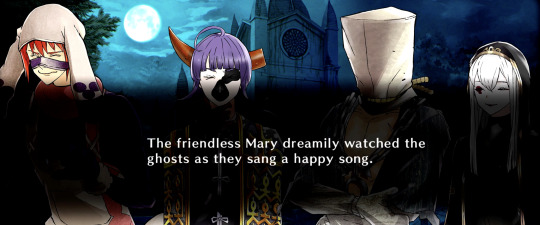
[image description: screenshot of summary text over the church and figures of the church ghosts. it reads "The friendless Mary dreamily watched the ghosts as they sang a happy song.]
Her costume specifically makes her look nearly as much the doll as the ones she makes - in the world of the story, because she's sewing both - but thematically, it ties her to them not only as their mother, but as a reflection of the Creature, herself.
Like the Creature, Mary is an odd mix of naivety and childishness, with startling gaps in her knowledge, and extreme skill and adult abilities. She knows what she knows well. Like the Creature, Mary has no memory of kindness, of family, of parents. She has only ever seen it in the way the Islanders interact with each other. She is the Creature here - raising herself, learning of the world through watching it, being reviled for every attempt she makes to reach out.
One thing the Creature explains to Victor is that he didn’t even understand, at the time, why he was being treated this way. He had no awareness of his own nature and what he looked like in the eyes of others. Only that they ran in fear and chased him away, and reacted with violence.
Mary Jane inverts this. Mary is human, but the humans around her are something she cannot understand. Like the Creature, Mary doesn’t understand why people react this way. The book expects you to come to the same conclusion as the play - the fault lies not with the Creature anymore more than it does with Mary, at this point. It is those around him, those around her, that are at fault, that are a thing neither can understand. Human’s are cruel. Ghosts who think they’re humans are cruel. It is a disconnect between themselves and the world around them they don’t understand, and desperately try to bridge over and over.
Even Mary, as quirky and childlike as she is, is on the verge of giving up, of being consumed by the Lonely Darkness. We don't know what her fate would have been if the Order of Shadows had not come. Victor's Creature, far more morose than Mary, gives up on connection, as well. He is denied the most basic of needs, and eventually, he learns the violence and hatred being directed at him, and, newborn that he is, lashes out.
But, ultimately, companionship and connection are the Creature’s goals, and it is that that he requests of Victor, who refuses to provide it himself. Make for me a mate. Mary is the Creature, and she is Frankenstein. She makes a friend for herself. Her motivation in creating Jacob is not science, it is not in defiance of death or God — very pointedly — it is out of loneliness - the same motivation that the Creature gives for his desire that Victor make him another like him. And when Mary does so, she’s a good mother, and a good friend.
Religion
Frankenstein’s full title is Frankenstein; or, The Modern Prometheus - it is about forming people, but it is also about stealing fire from the Gods. The question of if creating life out of death the way Victor does is an affront to God is something that Victor himself thinks about, but the book is much more interested in exploring it as the way characters view it. Victor punishes himself, it is not the Divine that punishes him. The Divine acts not as a force, but as an idea. One that both Victor and the Creature end up grappling with and trying to find their place within.
So that Mary herself seemingly has no concept of it, is fascinating. She goes to watch a chapel every night, but I don’t know she knows what a chapel even is. She mentions God once herself, saying that the smell of the garbage would be enough to affect even God, but she also talks to the Moon as a companion and a friend. Her worldview is uniquely hers, in relation to all things. As I said, the idea that making the dolls the way she does, or using corpse parts to do it might be sacrilege does not even occur to her.
Rather than go the route of the novel, Mary Jane twists this around too. In the world of Mary Jane, religious objects hold not only the power of an idea but an actual force. And it is a force that is completely, within the world of the show, amoral and nonsensical. The blessed weapons and fire the Order of the Shadows use are “holy” as a property, but that gives it no moral weight within the world of the play. And the play is messing with it the whole time. Holy wood or water can destroy a ghost, but they live in a church. Something that Charles and Figaro comment on, but cannot interrogate in terms of what it means for their conviction. But they’re split on how to proceed - the fact that ghosts can live in it doesn’t shake their faith, though. Sister Ghost is there largely for this joke. A nun who is constantly evoking the divine, who would be killed by a consecrated item.
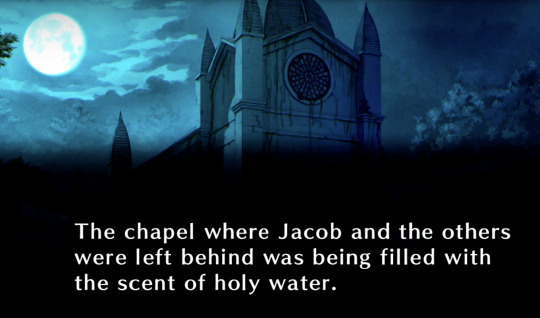
[image description: the summary text over the chapel backdrop with the text of "the chapel where Jacob and the others were left behind was being filled with the scent of holy water.]
If I could add something to Mary Jane, I would have loved for Mary or Jacob to ask Sister Ghost what “God” means (this is a conversation that happens in bonus material for Tokyo Ghoul once, actually). I would have loved to have that brought up more explicitly. But it’s also very funny that it never is.
The first definitions for a God we get are them being applied to Mary herself, with plenty of ambiguity on if the Order’s faith itself has a mother figure at its center or not. And either way it’s a fascinating play on the idea, and the themes of the novel.
Closing Thoughts, Other Connections and Ideas "Beyond the Scope of this Essay"
Anyway, all of this while playing around with everything else going on in this play, Neji’s totally, without permission, commentary on Fumi, on Tsuki’s legacy (please read the stage script, somehow the game thought it was a good idea to cut that whole specific reference even when making Kisa pick between an “erase Tsuki” option) and on Kai. On himself as an artist. ("I am the one who is strange. With my changing moods, with my hobbies. That is why everyone thinks I'm strange and avoids me.”). As with several other plays, a commentary on authority, and on creation, and on isolation and friendship and connection.
And, of course, what I’ve been holding back this whole little essay is that Mary Jane is, thematically, at its core, playing off the exact same situation as I Am Death. Like — both of these plays center around a woman pouring her emotions into an undead creature. I see you Neji. You can’t hide from me. Reading I Am Death as a Frankenstein Story remixed into an old Japanese mytho-history is a LOT of fun to do, but is, as the academics say, beyond the scope of this essay.
(and, I Am Death itself is about Neji and Chui, and the twisted, messy love-hate revenge drama they are acting out across all the routes in the game. Neji writes the plays that introduce Chui to the world. Then he runs. And spends the whole game trying to beat him (affectionate.). “Make me another like me” you say…
Literally the only thing I’ve come up with to make the “bad end” CG more compelling to me, is that this is what it’s riffing on. I like my I Am Death costumes way weirder.)
Mary Jane is a Frankenstein Story, I Am Death is a Frankenstein Story, Jack Jeanne is a Frankenstein Story. The other, other thing I’m leaving out here is that the Order of the Shadows are OBVIOUSLY pulled from Tokyo Grand Guignol, aesthetically. And the most famous TGG play is Litchi Hikari Club, which is, say it with me, a Frankenstein Story. Also one that takes the themes of the novel (gender, love and sexuality, childhood, genius, violence, blind pursuit to the point of madness, god complexes) harder than most, but runs with it in nearly the exact opposite direction. But again, very much beyond the scope of this essay.
Also also also leaving out the fact that Tokyo Ghoul is... kind of ... not not a Frankenstein story. It certainly riffs on the motif quite a bit. Even if you've never read it, you've seen the mask design (an in universe riff on the joke.).
Even just one dimension of this play, and look how many words you've made me write Neji-senpai.
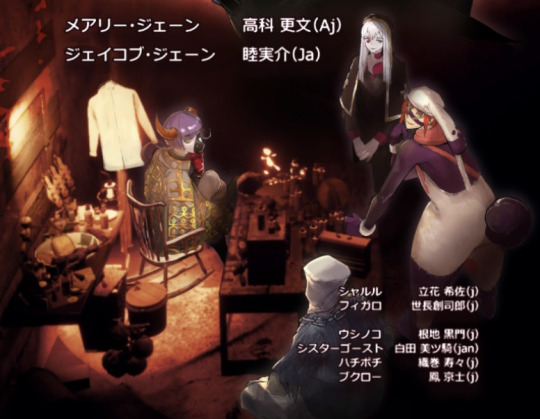
[image description: image from the bottom of the Mary Jane poster, with the cast list, showing the chapel ghosts with a focus on Ushinoko, Neji's character, looking towards the 'camera'.] Some little Halloween Spooktacular you’ve got there. Bravo.
#incoherent ramblings#the seagull spoilers#meta#yes i can rant about this forever#all of this#let! chui! play! The world soul! As! Al Jeanne!#this is a mean neji stan account and a chuza shuri hate account lol#neji#chui#i will remember how tumblr tags work one day#probably
52 notes
·
View notes
Text

LA CASA DEL POBRE - © - Raúl Lelli Tal vez se llamaba Ramón, o Roberto o Juan, poco importaba pues nadie o casi nadie le dirigía la palabra. Vivía entre unas barrancas cerca del río Cosquín a pocos metros del puente ferroviario casi en la desembocadura del lago San Roque. Su morada era más que humilde, precaria diría, hecha con maderas de rezagos de viejos pallets, pero con cierta habilidad le había dado forma de casa, pequeña, minúscula, pero con todo lo necesario para sobrevivir, eso, dentro de una humildad evidente, diría pobreza en grado supino. Vestía ropas desgastadas pero limpias, el calzado era evidentemente más grande que sus pies, sin medias, su contextura era de un hombre fornido, pero de avanzada edad, tal vez setenta y algo, su cabello canoso largo, algo desalineado contrastaban con una imagen dudosa de sus ojos celestes como el cielo, de mirada bondadosa, barba y bigotes teñidos por el humo del tabaco le brindaban un aspecto de espantapájaros con un sombrero de paja ya derruido por los años o tal vez el maltrato. Sus manos eran grandes, callosas con venas sobresalientes en la piel hablaban de por si sobre los trabajos rudos que aún hacía, cortando leña, pasto, yuyos y quehaceres en diferentes chalets de gente adinerada donde lo conchababan pagándole miserias, pero él no se quejaba. Su caña de pescar y habilidad le procuraban dos o tres veces por semana el sustento necesario; en unos cajones de frutas cultivaba algunas verduras y en una maceta hecha con cubiertas viejas un limonero generoso le convidaba sus frutos todo el año. Yo solía decirle Don Carlos, porque nunca me dijo su nombre; a veces pescábamos juntos y yo le obsequiaba anzuelos nuevos y tanzas, él generoso me proveía de lombrices gordas como pequeñas víboras y los camarones más grandes que él mismo criaba en la orilla del río. Los domingos solía llevar sanguches de mortadela y pasábamos horas en silencio, pescando; él con sus cigarrillos dibujaba nubes de algodón en cada pitada que dejaba salir de su boca displicentemente, como queriendo retenerlo, cuando el sol buscaba su cama en el horizonte la pesca estaba hecha y varias veces compartí una carpa o tararía asada en una improvisada parrilla hecha con esqueletos viejos de cajones de vino, exquisitas como ninguna otra comida compartida, yo en silencio escuchando sus maravillas. Cuando hablaba era una enciclopedia, me contaba historias, cuentos o relatos maravillosos, describía el mundo como si hubiera viajado por él describiéndolo con lujo de detalles, sabía de historia, toda diría, era algo así como una biblioteca viviente. Una mañana de junio muy fría, me dirigí a su humilde casa para ir de pesca pues era domingo, había helado y las plantas estaban chuzas llenas de escarcha. La puerta estaba cerrada y llamé con cierto vigor por si aún dormía ya que eran las ocho y algo, pero nadie contestó. Como intuyendo algo abrí la puerta que no tenía cerradura y cedió fácilmente. Don Carlos estaba acostado tapado hasta el cuello y al hablarle sin obtener respuesta lo toqué dándome cuenta que había muerto, tal vez por el anhidrido carbónico de una salamandra que aún estaba encendida o por alguna enfermedad que tenía. Antes de dar aviso a la policía, busqué entre sus ropas algún documento, pero sólo encontré en una viaja mochila del ejército una libreta de estudiante del año 1973 de la Universidad Nacional de Córdoba donde figuraban su paso y egreso de la Facultad de Filosofía y Letras, su foto muy joven y su verdadero nombre Alejandro Ramón Marciani. Debajo, bien al fondo había una especie de álbum de fotos, todas viejas donde había una mujer hermosa, dos niños y sus nombres que me declaraban ser la esposa y sus hijos; pero en la última hoja la foto de una lápida con el nombre de su mujer Rosa María Argañaráz y la fecha de defunción. No necesité más para comprender la soledad de mi maestro Don Carlos, aquel que me enseño sin proponérselo a dibujar estas líneas.
Fomentando la lectura.
10 notes
·
View notes
Text
Luke 8
Over the 24 days leading up to Christmas, I'm going to be posting a chapter of Luke every day. I encourage you to read through Luke's gospel and reflect on Jesus's time here on earth. Perhaps you'll find something new.
Masterlist
Luke 8 (NIV)
The Parable of the Sower
After this, Jesus traveled about from one town and village to another, proclaiming the good news of the kingdom of God. The Twelve were with him, 2 and also some women who had been cured of evil spirits and diseases: Mary (called Magdalene) from whom seven demons had come out; 3 Joanna the wife of Chuza, the manager of Herod’s household; Susanna; and many others. These women were helping to support them out of their own means.
4 While a large crowd was gathering and people were coming to Jesus from town after town, he told this parable: 5 “A farmer went out to sow his seed. As he was scattering the seed, some fell along the path; it was trampled on, and the birds ate it up. 6 Some fell on rocky ground, and when it came up, the plants withered because they had no moisture. 7 Other seed fell among thorns, which grew up with it and choked the plants. 8 Still other seed fell on good soil. It came up and yielded a crop, a hundred times more than was sown.”
When he said this, he called out, “Whoever has ears to hear, let them hear.”
9 His disciples asked him what this parable meant. 10 He said, “The knowledge of the secrets of the kingdom of God has been given to you, but to others I speak in parables, so that,
“‘though seeing, they may not see;
though hearing, they may not understand.’
11 “This is the meaning of the parable: The seed is the word of God. 12 Those along the path are the ones who hear, and then the devil comes and takes away the word from their hearts, so that they may not believe and be saved. 13 Those on the rocky ground are the ones who receive the word with joy when they hear it, but they have no root. They believe for a while, but in the time of testing they fall away. 14 The seed that fell among thorns stands for those who hear, but as they go on their way they are choked by life’s worries, riches and pleasures, and they do not mature. 15 But the seed on good soil stands for those with a noble and good heart, who hear the word, retain it, and by persevering produce a crop.
A Lamp on a Stand
16 “No one lights a lamp and hides it in a clay jar or puts it under a bed. Instead, they put it on a stand, so that those who come in can see the light. 17 For there is nothing hidden that will not be disclosed, and nothing concealed that will not be known or brought out into the open. 18 Therefore consider carefully how you listen. Whoever has will be given more; whoever does not have, even what they think they have will be taken from them.”
Jesus’ Mother and Brothers
19 Now Jesus’ mother and brothers came to see him, but they were not able to get near him because of the crowd. 20 Someone told him, “Your mother and brothers are standing outside, wanting to see you.”
21 He replied, “My mother and brothers are those who hear God’s word and put it into practice.”
Jesus Calms the Storm
22 One day Jesus said to his disciples, “Let us go over to the other side of the lake.” So they got into a boat and set out. 23 As they sailed, he fell asleep. A squall came down on the lake, so that the boat was being swamped, and they were in great danger.
24 The disciples went and woke him, saying, “Master, Master, we’re going to drown!”
He got up and rebuked the wind and the raging waters; the storm subsided, and all was calm. 25 “Where is your faith?” he asked his disciples.
In fear and amazement they asked one another, “Who is this? He commands even the winds and the water, and they obey him.”
Jesus Restores a Demon-Possessed Man
26 They sailed to the region of the Gerasenes, which is across the lake from Galilee. 27 When Jesus stepped ashore, he was met by a demon-possessed man from the town. For a long time this man had not worn clothes or lived in a house, but had lived in the tombs. 28 When he saw Jesus, he cried out and fell at his feet, shouting at the top of his voice, “What do you want with me, Jesus, Son of the Most High God? I beg you, don’t torture me!” 29 For Jesus had commanded the impure spirit to come out of the man. Many times it had seized him, and though he was chained hand and foot and kept under guard, he had broken his chains and had been driven by the demon into solitary places.
30 Jesus asked him, “What is your name?”
“Legion,” he replied, because many demons had gone into him. 31 And they begged Jesus repeatedly not to order them to go into the Abyss.
32 A large herd of pigs was feeding there on the hillside. The demons begged Jesus to let them go into the pigs, and he gave them permission. 33 When the demons came out of the man, they went into the pigs, and the herd rushed down the steep bank into the lake and was drowned.
34 When those tending the pigs saw what had happened, they ran off and reported this in the town and countryside, 35 and the people went out to see what had happened. When they came to Jesus, they found the man from whom the demons had gone out, sitting at Jesus’ feet, dressed and in his right mind; and they were afraid. 36 Those who had seen it told the people how the demon-possessed man had been cured. 37 Then all the people of the region of the Gerasenes asked Jesus to leave them, because they were overcome with fear. So he got into the boat and left.
38 The man from whom the demons had gone out begged to go with him, but Jesus sent him away, saying, 39 “Return home and tell how much God has done for you.” So the man went away and told all over town how much Jesus had done for him.
Jesus Raises a Dead Girl and Heals a Sick Woman
40 Now when Jesus returned, a crowd welcomed him, for they were all expecting him. 41 Then a man named Jairus, a synagogue leader, came and fell at Jesus’ feet, pleading with him to come to his house 42 because his only daughter, a girl of about twelve, was dying.
As Jesus was on his way, the crowds almost crushed him. 43 And a woman was there who had been subject to bleeding for twelve years, but no one could heal her. 44 She came up behind him and touched the edge of his cloak, and immediately her bleeding stopped.
45 “Who touched me?” Jesus asked.
When they all denied it, Peter said, “Master, the people are crowding and pressing against you.”
46 But Jesus said, “Someone touched me; I know that power has gone out from me.”
47 Then the woman, seeing that she could not go unnoticed, came trembling and fell at his feet. In the presence of all the people, she told why she had touched him and how she had been instantly healed. 48 Then he said to her, “Daughter, your faith has healed you. Go in peace.”
49 While Jesus was still speaking, someone came from the house of Jairus, the synagogue leader. “Your daughter is dead,” he said. “Don’t bother the teacher anymore.”
50 Hearing this, Jesus said to Jairus, “Don’t be afraid; just believe, and she will be healed.”
51 When he arrived at the house of Jairus, he did not let anyone go in with him except Peter, John and James, and the child’s father and mother. 52 Meanwhile, all the people were wailing and mourning for her. “Stop wailing,” Jesus said. “She is not dead but asleep.”
53 They laughed at him, knowing that she was dead. 54 But he took her by the hand and said, “My child, get up!” 55 Her spirit returned, and at once she stood up. Then Jesus told them to give her something to eat. 56 Her parents were astonished, but he ordered them not to tell anyone what had happened
....
All of this was taken from the Bible Gateway, which is an online Bible that you can easily search up. For those of you who do not have Bibles of your own, I encourage you to use online resources like Bible Gateway to read God's word.
Happy Holidays!
If you have any questions regarding the Christian faith, please ask me in my ask box. I am not a perfect person, but I will try and answer your questions as best as I can. We all have much more to learn, myself included. So please, do not be shy.
#christianity#faith in jesus#jesus christ#christian faith#god#jesus#faith#faith in god#christian blog#christmas advent calendar#christmas calendar#christmas countdown#christmas
7 notes
·
View notes
Text
Gentile. | Chapter XXXVIII

You have a heart to heart with Gaius.
Chapter list
A few slow days pass, which eventually melt into weeks. You only measure time by the steady growing of your belly and counting the days you’ve last seen Atticus, which is a number growing painfully larger and larger. There isn’t a whole lot going on lately regarding Jesus of Nazareth — you reckon He is out of town — but it doesn’t shrink the expanding tent village that Quintus had considered imposing taxes on. Judging by his everlasting sneer, you establish that he hasn’t been successful so far.
One thing does change, though. Somehow, Quintus seems to soften towards you, and you aren’t sure why. Perhaps it’s the growing exhaustion visible on your face, the way you are starting to waddle around rather than walk, or maybe it’s the restless tossing and turning at night that has him somehow loosening the usually tight ropes of his control. A cynical part of you wonders for how long it will last. Living with an individual like him, it’s difficult to not be walking around on eggshells regardless of his seemingly more lenient mood.
Your days are filled with writing to your brother and to Joanna as well as scribbling on some poetry, although you hardly find yourself inspired. You often read the book Atticus had gifted you in the shade of the tree in the garden front to back and then again, and you can almost recite it word for word from the top of your head at this point. Perhaps you should pick up something new from the library some day in order to find new motivation to write.
An idea has been dancing around your mind, and although you have been turning it over and over inside your head, you have not decided what to do with it yet.
Through your correspondence with Lucius, you’ve heard that Lucilla is barely getting better as time progresses. Priests and healers have released their treatments, prayers and concoctions onto the newborn, but you can see by the way the parchment is stained with tears that no good news ever comes from Rome these days. Lucius has barely had time to grieve his late wife with the concern regarding his girl, and if he lost the baby, too…
Something weighs heavily on your heart.
You are overtaken by the inexplicable urge to insist Lucius to come visit Capernaum with his daughters, that Jesus may see her and heal her ailment. You know Jesus’ healings are not exclusive to Jews. Still, there is a nagging feeling in the back of our head which you choose to ignore, one that tells you that He will not care about a Roman child, let alone the niece of the very Praetor who has been making life not much easier for Him and His followers. You’re trying your very best to not pay that annoying little voice any mind.
Another issue remains. You haven’t told Lucius about Jesus yet, and with all the letters to and from him being read by Quintus before he allows you to send them out, you fear you won’t be able to subtly tell him about it. In spite of your husband’s increasing tolerance towards you, this is something he won’t budge on, even if you were to ask him to respect your privacy. You have briefly considered sending secret letters instead like you had done to Atticus before, but you aren’t certain what kind of arrangements the magistrate has made with the clerk at the post office. For all you know, Quintus has set strict rules on letters written by you requiring his personal seal as well before being sent out.
Even Joanna picked up on it, realising that the uncharacteristic superficiality within your letters does not come from a voluntary hand and in turn has decided to switch up her language by referring to John the Baptist as ‘the prisoner’ and her husband Chuza as ‘the strange steward of Herod’. Perhaps you should follow her example and somehow cryptically get the message about Jesus across.
The Healer. The Miracle Worker. The Preacher. The terms crossing your mind as to refer to Jesus are way too obvious for Quintus to realise Whom you are talking about. So, you decide to approach it differently.
‘Perhaps you should come visit us soon. A change of scenery might do her good. The air here is cleaner than in Rome and the minerals the healers use here come straight from the Dead Sea.’
Quintus reads over your letter to Lucius, and his brow furrows.
“Do you really want to invite them over here? Wouldn’t it be too much pressure on you, seeing that you’re getting closer to your due date?” You’d almost be convinced that he is actually concerned.
“I don’t see how it would pose a problem.” you tell the Praetor. “If anything, he might be able to help out.”
Quintus lets out a long hum, narrowing his eyes as he lets them roam over the letter. “I see.” he mutters, not too keen on the idea of having a toddler as well as a wailing, sickly baby under his roof at the moment. “Hm. Very well.”
The smiles you give Quintus rarely reach your eyes, but this time, it’s genuine.
“Thank you.” you mutter, and he looks up at you with something akin to scrutiny.
“Hm.” he hums again, observing you. Your smile slightly falls as you look at him in question.
Tucking some hair behind your ear, you straighten your back. “What?”
Your husband dismissively waves his hand. “Nothing. Just… No, nothing.”
Holding the rolled up letter in your hand, you frown a little at Quintus, a pit forming in your stomach. There is something on his mind and he’s not voicing it out loud. You can’t decide whether that’s a good or a bad thing.
You excuse yourself and head for the nearby booth to post your letter, handing the clerk your ring to seal it for you. A thrill goes through you as you watch him tuck it away for the courier, excited at the prospect of your brother and nieces visiting you, and in turn, Lucilla getting healed by Jesus.
Thanking the man, you waddle away and hold your hand under your tummy, resting the other on your hip to support your aching back. You wonder if you should head to the marketplace on your own, but decide to ask Gaius to join you instead. Perhaps, if you find an opportunity to mention that you are aware that the Primi knows, you can figure out why he decided to not tell Quintus in spite of his duty and vows.
You find the Primi with a pondering crease in his brow as he sips a cup of water – the cistern is still broken but servants walk back and forth from the well outside of the village – while sitting next to Julius in the square in front of Quintus’ office.
A few wary gazes shoot your way from townsfolk and soldiers alike, who start to whisper amongst each other. You feel an uneasy pit forming in your gut at the way they’re eyeing you up and down. Instinctively, you put a hand over your belly, but the motion only seems to fuel their mutterings. The glances range from disgusted to curious.
“Lady (Y/n).” Julius immediately greets you as you walk up to him and the Primi, giving you a small bow of his head. You nod at him in greeting and smile, then turn to Gaius.
“Would you join me to the market, Primi?”
The whispering ceases as all eyes turn to you and Gaius. He puts down his cup, looking at the people around him for a moment before he gets up.
“Of course, my lady. Lead the way.”
The two of you walk off under intense scrutiny and it isn’t until you’ve turned the corner that you dare to speak. “I’d like to see the tent city.” you state matter-of-factly, knowing that the city walls make for moderate privacy.
No other words are exchanged for a while as you ascend a flight of stairs, which is a task in and of itself now that your baby is getting significantly heavy, and slightly out of breath, you halt right where the tent city is located. Gaius remembers standing here next to your lover a while ago, discussing the same city your gaze is now focused on.
“What was that about?” you ask, slightly breathless, “What were they whispering about?”
Gaius' face flashes with guilt, even though he himself has not been the one who opened his mouth about anything that has been going on.
“As the cohorte may have mentioned to you, there is a soldier other than myself who knows about… You know. And… It so happens that said soldier likes to gloat about anything just to appear interesting to the others.”
One and one is two. You don’t need to inquire further, nor do you have to ask who the patrolling soldier in question was. You could check Quintus’ ledgers to check who was on patrol with the Primi during your little rendezvous that day, but you know better than to bring Gaius’ trust and your budding friendship into peril for something that cannot be reversed regardless of how you’d act. It wouldn’t make a difference to know, anyways.
“I was wondering why you chose to not tell Quintus.” Although you know he respects both you and Atticus, you wonder if the Primi would reveal some other reasons.
Gaius takes a deep breath before responding. “First of all, I have borne witness to several… Quarrels between you and the Praetor. Moments that have made me feel uneasy. Made me feel sympathy for you. I cannot imagine speaking to my wife like that, and I know that you are a bit acquainted with her, so there’s that.”
You avert your gaze back to the camp. “I see.”
The Primi carries on. “I can see the way you shrink around Quintus. The way your eyes become dull and the silence that befalls you. It’s the complete opposite from whenever I see you around Atticus. Your eyes light up, your body language turns open and bright, and… Well, let’s just say that I can see you are very happy with him.”
It’s a surprising answer and you turn to Gaius with a mixture of puzzlement, awe and gratitude. “That’s… Really thoughtful of you, Gaius. You owe me nothing, and yet…”
He smiles a bit and nods. “I do what I can. I may have duties towards your husband, but I choose to omit certain information in this case. As long as he doesn’t inquire about it, I don’t have to say anything.”
Humming, you slide your hands over the smooth stone of the wall. You lean against it in favour of your aching ankles.
“Thank you.” you say in earnesty, and he gives you a soft, kind look.
“It’s nothing.”
Gaius seems as if he wants to say something else, but seems to decide to swallow the words instead as he follows your gaze to the tent city. It has only grown since the last time he was here, and he has started to recognise a few faces from here and there, pointing out a few potential troublemakers by sight alone.
“I also know when to pick my battles. This isn’t worth losing my job over. If Quintus wouldn’t get rid of me, Atticus would do so if he found out that I talked. So I remain quiet.”
A soft smile tugs at your lips as you thumb a particularly sore, itchy spot on your tummy.
“So you’re better off by remaining in Atticus' good graces and risk Quintus getting upset with you for not telling him about the affair, than if you were to tell Quintus just because of your duty and then to lose your position because of Atticus’ influence.”
“Something like that.”
A brief silence comes over you two as you stand there. You watch the pilgrims for a while. The ambiance coming from the tent city is both peaceful and crackling with anticipation. It seems that everyone around here has been wondering where Jesus has been these past days, yourself
included.
Your gaze flickers to Gaius, who has a thoughtful look on his face.
“A denarius for your thoughts, Primi?”
“It’s nothing.” he counters - too quickly to not be considered overly defensive - and you tilt your head a little in question. Gaius sighs and lowers his gaze. “Just… Trouble at home.”
Your eyes widen. “Livia?”
He observes you for a long moment, seeing genuine concern in your eyes. It would only be fair to reveal a little about his own issues, compared to how Gaius himself knows all about the skeletons in your closet.
“In a way.”
The cryptic reply doesn’t answer anything. He rubs his forehead in an attempt to ease the sudden tension growing within his skull in an attempt to get rid of it before it turns into a raging headache.
“There uh… We have this servant boy… He’s been ill for a long while now, and no doctor seems to be able to help him. We’ve tried everything. I… I fear the worst.”
You swallow hard. “A servant boy, you say. What does this have to do with Livia?”
“Because the boy is my son.” Gaius confesses, causing your heart to drop. You had always perceived Gaius a man to be faithful to his wife, seeing his unwavering duty to the Empire in spite of his Germanic origins, so the revelation makes you feel a pang of sadness. “He comes from a mistake I made in the past. I had this… Brief fling with one of our slaves and got her with child, and then she died during labour. I felt guilty towards both my wife and the servant, felt obligated to take him in as a servant. It’s… It has definitely put a strain on our relationship. We don’t… We don’t really talk about it.”
“Do you feel like you are allowed to worry about him, since he’s… Would he… Would he be considered a bastard child?” you question out loud.
Gaius stares off into the distance and shrugs. “It’s complicated.” When you don’t open your mouth, he realises you’re waiting for an answer. “I can no longer deny that he is indeed my son and I cannot pretend to refute it, either.”
There is vulnerability in his shoulders as they slump a bit.
His situation is a bit like your brother’s, different in a way, but you understand the pain he must be going through. Seeing Lucius go through it as well, you know how heavy it must be on him.
What better advice to give the Primi than the exact same advice you’re planning on giving to your brother?
You breathe in to speak. “Gaius, I want to ask you a question and I want you to answer me honestly.”
The Primi lets his gaze flicker to you, puzzlement visible on his features. “What is it, my lady?”
“What do you think of Jesus of Nazareth?”
You know that he has had some kind of interest in Him, especially since Matthew has started to follow this Teacher and in turn left everything behind, but you haven’t asked him about it upfront. Hoping to find some common ground, you give the Primi a gentle smile.
“He is a charismatic Teacher. I can understand their interest.”
“And you, Primi?”
“Pardon?”
“Does He have your ear?”
Gaius’ lips slightly part when he looks at you. “My lady, I do not know how to answer that question.”
“You know you can tell me, right? It’s not like I’d be one to talk.”
“So you’re interested in Him and His teachings?”
You huff a small smile and wince as you feel a painful kick against your bladder. You hope to find a lavatory soon.
“Ah. I thought that I was pretty obvious in my interests.”
The Primi gives you a concerned look.
“Are you alright, my lady?”
You realise there must have been a strain your voice at the moment you spoke, and you nod your head.
“I’m fine. Just the baby being very active at the moment. But please, Primi. Don’t avoid my question or change the topic.”
Letting out a long sigh, Gaius’ gaze goes back to the camp, taking in the ever-growing perimeter as he wonders what he should or should not tell you. He knows he can trust you in spite of your rebellious advances towards the man he serves. There is genuineness in your voice as well as on your face, and truth be told, Gaius could indeed tell that you had been interested in Jesus of Nazareth, judging by your behaviour and insistence to be present at the Sermon on the Mount.
“I suppose that we can both say that we have seen things that we cannot properly rationalise when compared to our own understanding or our Roman deities.”
You hum. You have visited the home of Gaius and Livia once or twice and seen the altars to the gods in their hallway, adorned with candles and fresh fruits.
“I’ve been thinking the same thing. Our own gods, what have they ever done for me? How do they compare to… To Jesus? To that Father God He speaks of?”
“Are you saying that you believe He is divine?” Gaius asks.
You think for a long moment. Your silence does not confirm nor deny. After all, you are still trying to figure things out, despite your heart already hammering inside your chest at the notion.
For a while, the two of you digest the heaviness of the statement as it lingers between you. Gaze focused upon the crowd, you hold your tummy and slide your palm over it.
“I think…” Gaius whispers all of a sudden, “…I think that I should go see Jesus about my son.”
Your heart rears as you turn to the Primi with a shocked expression on your face, trying to comprehend what he is implying exactly, and you look at him with parted lips over which come no words, although so many questions well up inside your mind.
Then, you take a sharp breath when Gaius does not explain himself any further.
“He would not deny you.”
A small flicker of something seeps into the Primi’s expression and he smiles, as if some kind of understanding has just taken root between the two of you. The same kind of thing you feel whenever you are discussing Jesus with Joanna.
Gaius is looking at you in a way that convinces you that he has not encountered another Roman before who shares the same beliefs about Jesus as him. It is almost as if the Primi had expected you to shun him for what he thinks is true.
There is a silence for a long while.
“Perhaps I should bring you home... I mean, to your house.”
There is a certain edge to his voice that you appreciate when Gaius corrects himself, as if he is fully aware and understanding how the mansion you share with Quintus is not a home to you.
“Yeah, maybe I should head back.” You do not wish to test the limits of your husband’s newfound and most likely fickle compassion.
The two of you take the slow, long route back, over the city walls. Part of you wants to ask the Primi about Atticus, but you reckon he knows as much as you do. You ignore the dull ache in your ankles as you walk.
“Can we stop at the public lavatory?” you request, the pressure in your abdomen growing stronger.
“Of course.” Gaius says, and leads you to the nearest Roman bathroom so you can relieve yourself.
Once done, you fix your skirt and readjust your stole, exiting the space at the back of the building and taking a moment to rub your sore shoulders, not wanting to head back to Gaius and thus to Quintus just yet. Letting out a long sigh, you stand for a few seconds, taking in the hustle and bustle of the city. Right as you are about to turn and head back to the front to meet with the Primi again so he can escort you home, a Jewish woman nearly bumps into you. Her dark eyes widen in surprise as she looks at you.
“Oh, I’m sorry.”
“No need, all my fault.” you reassure her. A relieved smile forms over her lips and she lets her gaze go over you, taking you in, and you think for a moment that she recognises you from somewhere and that you should recall her face, too, but instead her eyes go to her belly. The faintest of hums leave her as something glitters in her eyes, her own hand going to her tummy as well, and you don’t even need to ask to know that she’s likely expecting too, although not yet showing.
It is a moment of brief, intimate understanding. Something that goes far beyond wealth, religion and culture.
“Bye, now.” the woman breathes before brushing past you, and you watch her leave for a moment before sighing, smiling a little before it falls again. Then, you head back to Gaius, your gut twisting unpleasantly as you know you’re headed back to Quintus, not necessarily keen on spending yet another evening with him.
---
Chapter list Next chapter
#the chosen#reader insert#the chosen x reader#chosen x reader#atticus aemilius pulcher#atticus x reader#the chosen atticus#gentile#quintus x reader#the chosen quintus
9 notes
·
View notes
Text
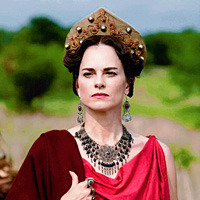
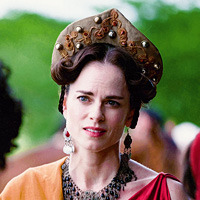
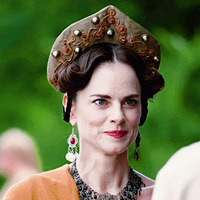
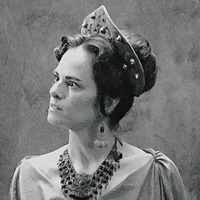
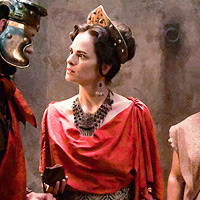
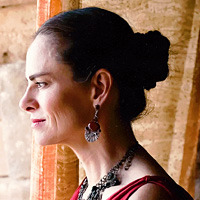
icons of Amy Bailey in The Chosen (s3) as Joanna
#amy bailey icons#thechosenedit#amybaileyedit#period fc#the chosen#joanna#amy bailey#joanna wife of chuza#rpg resource#rp icons#icons#*icons#*mine
18 notes
·
View notes
Text
Joanna to Chuza on having a good time at the banquet

#The Chosen#The Chosen TV#the chosen series#the chosen tv series reaction post#The chosen series gif post#the chosen tv series
7 notes
·
View notes
Text

SACRIFICE: BEING A PARTNER TO GOD'S WORK 2
1 NOW IT CAME TO PASS, AFTERWARD, THAT HE WENT THROUGH EVERY CITY AND VILLAGE, PREACHING AND BRINGING THE GLAD TIDINGS OF THE KINGDOM OF GOD. AND THE TWELVE WERE WITH HIM,
2 AND CERTAIN WOMEN WHO HAD BEEN HEALED OF EVIL SPIRITS AND INFIRMITIES—Mary called Magdalene, out of whom had come seven demons,
3 and Joanna the wife of Chuza, Herod’s steward, and Susanna, AND MANY OTHERS WHO PROVIDED FOR HIM FROM THEIR SUBSTANCE."
Luke 8:1–3 (NKJV)
• Whose work is it? Is it the visionary's work or God's?
- The Owner of the work is God, not the visionary or the minister. The pioneer of the work or the minister that was given the vision is not the one who owns the ministry work.
- Whoever is there to support the ministry work or the assignment is a co-labourer with the pioneer or the visionary or the founding minister (1 Corinthians 3:6-9).
- This point had to be well understood by whoever is planted in a ministry to be part of the work there, or to use their material possessions to support the work; as seen in Jesus' earthly Ministry, in the text of this teaching (Luke 8:1-3).
- If this point is not well understood, a believer who is planted in a place, a church, or raised to support a ministry; can easily be swayed and his or her mind be distorted and stopped being faithful in whatever God has assigned them to do as a responsibility to the church or ministry.
- Note: whatever you are assigned to do; to support a ministry or a church or a minister; It is a responsibility and not an obligation. Although, some who give to the work of God see it as an obligation, thus, they give sparingly and grudgingly—without being cheerful:
6 BUT THIS I SAY: HE WHO SOWS SPARINGLY WILL ALSO REAP SPARINGLY, AND HE WHO SOWS BOUNTIFULLY WILL ALSO REAP BOUNTIFULLY. 7 So let each one give as he purposes in his heart, NOT GRUDGINGLY OR OF NECESSITY; FOR GOD LOVES A CHEERFUL GIVER" (2 Corinthians 9:6,7 NKJV)
• The Rewarder—God.
- God the Rewarder is not partial and not a respecter of persons (Romans 2:11; Acts 10:38).
- God, the Owner and the Rewarder of whoever did the work, would not reward whoever is not faithful in his or her own part.
- It is a mandatory thing to do; whether you are the visionary or the partner or supporter—one who offer help. It is a responsibility as earlier said, but at the same time, could be obligatory: "IF I SPREAD THE GOOD NEWS, I HAVE NOTHING TO BRAG ABOUT BECAUSE I HAVE AN OBLIGATION TO DO THIS. HOW HORRIBLE IT WILL BE FOR ME IF I DON'T SPREAD THE GOOD NEWS!" (1 Corinthians 9:16 — GOD’S WORD Translation).
"I TELL GOD'S GOOD NEWS TO PEOPLE. BUT I HAVE NO REASON TO BE PROUD BECAUSE OF THAT. IT IS SOMETHING THAT I HAVE TO DO. If I did not tell the good news, IT WOULD BRING ME GREAT TROUBLE."
1 Corinthians 9:6 (EasyEnglish Bible)
- If you are being blessed in your work, whatever you do as a secular work, in order to support a ministry or minister; If you are not faithful, as in using the resources or money being channelled through your hands for God's intended purpose—to support the assigned ministry or work or the minister—the flow of the blessings might be halted or truncated.
• The purpose.
- The main purpose of whatever vision or plan or ministry or assignment given by God to anyone is to bless mankind—bring people to Him and His Kingdom on earth (2 Corinthians 5:18-20).
- God would through the faithfulness of whoever is assigned; either as the vissionary, the sent one; or the partners or the supports, the one to offer help or aid, bless and lift them—bless them materially.
- Note: no one should receive glory to himself or herself on whatever is done or accomplished through the work; either the visionary or those who support—the partners.
• A word to the partners or the supports.
- If your heart or motivation were not right in doing whatever you are doing to support the work; It might attract a curse or punishment to your life, instead of blessings or rewards (Acts 5:1-10).
- Whatever being given as a seed or offering or sacrifice is done to support the work; should all be done with Joy and cheerfulness, and not with grudges (2 Corinthians 9:7).
- It should be done with love; you give to God's work or support a ministry or a minister because you love God (1 Kings 3:3).
- Whatever you are doing; Giving of your substance or whatever, should be without any sentiment.
- And also, you should not do whatever you do or give whatever you give because you wanted to receive the praise of men: "THEREFORE JUDGE NOTHING BEFORE THE TIME, UNTIL THE LORD COMES, WHO WILL BOTH BRING TO LIGHT THE HIDDEN THINGS OF DARKNESS AND REVEAL THE COUNSELS OF THE HEARTS. THEN EACH ONE'S PRAISE WILL COME FROM GOD" (1 Corinthians 4:5 NKJV).
- Note: when you give with a good heart or motivation:
a. the anointing on the ministry and the minister will work for you; rest on your life and whatever you are doing for living.
b. You will experience God's faithfulness in forms of blessings in all your endeavours.
• You will not fail in Jesus' name.
- Should there be any ailment in your body, receive your healing now in Jesus' mighty name.
- The hold that is broken now will never be formed again, in the mighty name of Jesus Christ.
Peace!
STEPS TO SALVATION
• Take notice of this:
IF you are yet to take the step of salvation, that is, yet to be born-again, do it now, tomorrow might be too late (2 Corinthians 6:1,2; Hebrews 3:7,8,15).
a. Acknowledge that you are a sinner and confess your Sins (1 John 1:9); And ask Jesus Christ to come into your life (Revelation 3:20).
b. Confess that you believe in your heart that Jesus Christ is Lord, and that you confess it with your mouth, Thus, you accept Him As your Lord and Saviour (Romans 10:9,10).
c. Ask that He will write your name in the Book of Life (Philippians 4:3; Revelation 3:8).
- If you took the steps As highlighted above, It means you are saved—born-again. Join a Word based church in your area and Town or city, and be part of whatever they are doing there. Peace!
#christianity#gospel#christian living#christian blog#jesus#the bible#devotion#faith#my writing#prayer
3 notes
·
View notes
Text
Caged (JoannaxAndrew)
Author’s Note: This does contain minor spoilers for season 4, but if you know the Biblical story, you know about the event anyway. Still, I wanted to mention it upfront cause I don’t want to assume anything. But I hope you enjoy!
Joanna lay awake in her quarters, the moonlight drifting in with the gentle breeze through the window, the gossamer curtains rising and falling like a sigh. She stared at the ceiling, covered in mosaic designs that her mind could endlessly twist into shapes and scenes. Lately, all she could see was the falling head of John onto a silver plate. A wedding plate, no less. A cruel fate devised by a cruel and ugly heart. Salome, the poor girl, had no interest or even much personal knowledge of John. She only knew what her mother told her, only followed her orders. Rumor had spread when she actually saw the horrible deed she’d done, she fainted. And Herodias had grinned.
Joanna turned towards the window, clutching her chest. She tried not to cry again. Tears did not bring back the dead. Sitting on the table at her bedside was a parchment. She bolted upright, grabbing the paper. It was a letter from Andrew. God forbid, Chuza could have discovered it. Not that he had been visiting her quarters often anyhow. Her association with John was known, but such a direct line to Jesus could put them both in danger. That’s not to even mention the presence of a letter from another man in her chambers.
Although, she supposed she should not consider Andrew like that. They were friends, of course, followers of the same Rabbi, but in these lonely nights she let her imagination wander back to that day in her carriage when she heard Jesus’ sermon on the plain. Andrew smelled like the fresh salt of the sea, like it was in his blood, and his warm eyes were so full of kindness. He seemed so awkward being alone with her, trying to be as respectful as possible. She found him endearing. And…he was quite handsome.
Her eyes drifted over the words once again. Andrew was not a formally educated man. He wrote plainly, without the pretension of political ambition or feeling as though he had to impress her. It was a welcome change from the sneering, overindulged flattery of court. He told her of Jesus’ ministry, of the group and their well being. But this last letter was personal. He didn’t talk about the others. Only of the two of them.
Shalom, Joanna,
I wish I had told you this when I saw you, but the grief over John did not allow it. I wanted to thank you, not only for your contribution to Jesus’ ministry, but also for the friendship you have given me. I am grateful for your help in seeing John that final time. I hope it was not the last time I see you, you are as much a part of the group as anyone else if you ask me. Passover is soon. Perhaps we will meet in Jerusalem.
Shalom, shalom, Andrew.
She cherished those words. And she wished she believed she was much a part of the group as he was, but she was here in a palace while they were sleeping in tents. In truth, she wanted to leave here. Leave everything behind and follow Jesus…and see Andrew again.
She held the letter close and prayed for Jesus and his friends before tucking it beneath her pillow and laying back down, still imagining the salt of the sea.
#the chosen#the chosen tv series#the chosen tv show#the chosen fanfiction#andrew the chosen#joanna the chosen
16 notes
·
View notes